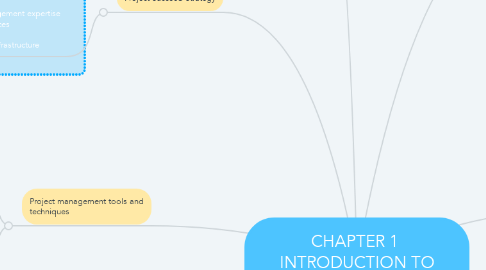CHAPTER 1 INTRODUCTION TO PROJECT MANAGEMENT
by Nur Shafiqah Ruslee


1. Project management tools and techniques
1.1. On purpose to assist project managers in various aspects of project management
1.2. SUPER TOOLS 1. High Potential Tools - Software - Scope statements - Requirement analysis - Lesson-learned reports 2.Existence Tools - Progress reports - Kick-off meetings - Gantt Charts - Change Requests
2. Project Succeed Strategy
2.1. 1. User involvement 2. Executive support 3. Clear business objectives 4. Emotional maturity 5. Optimizing Scope 6. Agile process 7. Project management expertise 8. Skilled resources 9. Execution 10. Tools and infrastructure
3. Federal 'TOP-THREE' succeed reasons
3.1. 1. Adequate funding 2. Staff expertise 3. Engagement from stakeholders
4. IMPORTANCE OF LEADERSHIP SKILLS
4.1. 1.Effective project managers provide leadership by example
4.2. 2. A leader focuses on long-term goals and big-picture objectives while inspiring people to reach those goals
4.3. 3. A manager deals with the day-to-day details of meeting specific goals
4.4. 4. Project managers often take on the role of both leader and manager
5. ETHICS IN PROJECT MANAGEMENT
5.1. 1.Ethics, loosely defined, is a set of principles that guide our decision making based on personal values of what is “right” and “wrong
5.2. 2. Project managers often face ethical dilemmas
5.3. 3. In order to earn PMP certification, applicants must agree to PMI’s Code of Ethics and Professional Conduct
5.4. 4. Several questions on the PMP exam are related to professional responsibility, including ethics
6. What is Project Management?
6.1. Can be define as the application of processes, methods, skills, knowledge and experience to achieve objectives according to the project acceptance
6.2. Advantages of Formal Project Management:
6.2.1. 1. Financial, physical & human resources well-controlled
6.2.2. 2. Improved customer relations
6.2.3. 3. Shorter development times
6.2.4. 4. Lower costs
6.2.5. 5. Higher quality & increased reliability
6.2.6. 6. Higher profits margins
6.2.7. 7. Improved productivity
6.2.8. 8. Better internal coordination
6.2.9. 9.Higher worker morale
